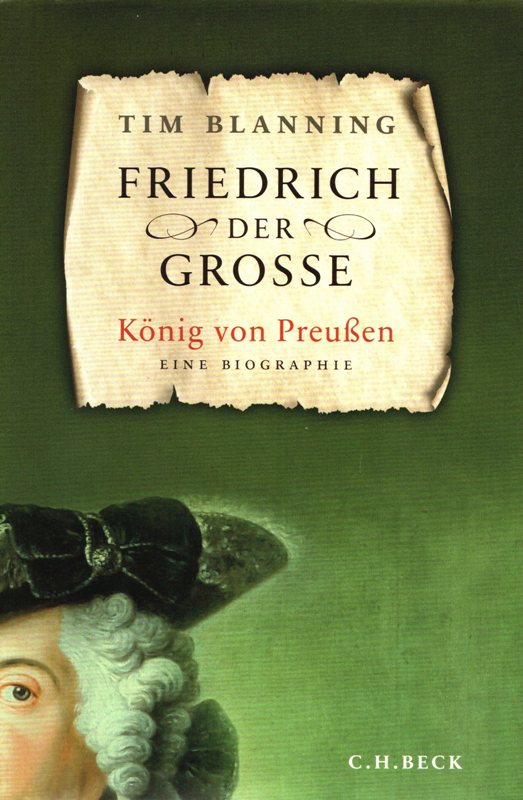BLANNING,T., Friedrich der Grosse. München 2018
Friedrich der Grosse. König von Preußen. Eine Biographie. Aus dem Englischen übersetzt von Andreas Nohl. München, Verlag C. H. Beck, 2018.
8vo. 718 S. Pappband mit Rückentitelschild, Lesebändchen und Schutzumschlag. ISBN: 978-3-406-71832-8
In Tim Blanning hat Friedrich seinen idealen Biographen gefunden. Er zeigt uns den ‘alten Fritz’ in seiner ganzen kaltblütigen Brillanz” (The Sunday Times) – In Tim Blanning, Friedrich has found his ideal biographer. He shows us the ‘old Fritz’ in all his cold-blooded brilliance” (The Sunday Times).
[Translation into English follows on from the German text] – Das Buch von Tim Blanning erschien im Original bereits im Jahre 2015 beim Verlag Allen Lane in London. Die deutsche Ausgabe folgte im Jahre 2018 und man kann die Biographie mit Fug und Recht neben die bedeutenden Biographien von Theodor Schieder (1983) und Johannes Kunisch (2004) stellen. Während Schieder Friedrichs “Königtum der Widersprüche” ins Zentrum stellt, legt Kunisch seine Biographie eher als eine Art “Bildungsroman” an. Blanning fügt beide Perspektiven nun zusammen, indem er die Widersprüche und die Zerrissenheit Friedrichs aus den Traumata seiner Kronprinzenzeit herleitet, deren Kompensation er in verschiedenen Verhaltensmustern suchte: in einem monomanischen Herrschaftsstil, in einer Ruhmsucht mit großem Bedacht auf seinen Nachruhm, in seinen repräsentativen Bauten, in seiner Herzenskälte, Misanthropie und Rechthaberei, in seiner Kriegführung, aber auch in seiner Liebe zur Kunst und Philosophie – oder auch in seiner Homosexualität. Während Schieder und Kunisch die Homosexualität des Königs “umschiffen” und nicht zur Sprache bringen, lässt sich dieser Sachverhalt nach Blanning nicht mehr weiter verheimlichen. Friedrichs Sexualität steht aber nicht im Mittelpunkt des Buches, obwohl man es nach einigen Besprechungen vermuten könnte. Auch die Kriege Friedrichs stehen – glücklicherweise und für viele Leser sehr angenehm – nicht im Mittelpunkt des Buches und nehmen deshalb auch nicht übermäßig viel Raum ein. Es handelt sich für Blanning eben “nur” um Verhaltensmuster unter vielen, mit denen der Sohn Friedrich sich aus den “väterlichen Ketten” zu befreien versuchte. Blanning stellt Friedrich als gebrochene Persönlichkeit dar, die “keine andere Wahl (hatte), als sein Trauma auf immer neue Weise auszuleben… Ein großer Vorzug von Blannings Buch liegt darin, dass er die Widersprüche, die Friedrichs Regierungszeit durchziehen, weder rhetorisch glattzubügeln noch pathetisch zu überhöhen versucht, sondern das Für und Wider des fritzischen Absolutismus nüchtern abwägt… Als Königsdarsteller hat Friedrich die Könige seiner Zeit besiegt. Diese Bilanz eines barocken Herrscherlebens hat noch kein Friedrich-Biograph so knapp und schlüssig gezogen wie Tim Blanning” (Andreas Kilb, FAZ). Das tut Blanning in erfrischend zeitgemäßem Ton, was sein Buch sehr gut lesbar macht und sich somit an ein größeres wissenschaftlich interessiertes Publikum richtet. – Timothy Charles William Blanning (geb. 1942) studierte am Sidney Sussex College in Cambridge und verbrachte auch seinen weiteren wissenschaftlichen Werdegang in Cambridge: Promotion 1967, Assistant Lecturer an der University of Cambridge 1972, Lecturer 1976, Reader 1987 und schließlich seine Berufung zum Professor im Jahre 1992. Er lehrte bis zu seiner Emeritierung im Jahre 2009 in Cambridge die moderne europäische Geschichte. Für sein Buch über Friedrich den Großen wurde er im Jahre 2016 mit der “British Academy Medal” ausgezeichnet. [von KB]
Tim Blanning’s book was published in the original by Allen Lane in London in 2015. The German edition followed in 2018, and it is fair to say that the biography can be placed alongside the important biographies of Theodor Schieder (1983) and Johannes Kunisch (2004). While Schieder focuses on Friedrich’s “Königtum der Widersprüche” (The Kingdom of Contradictions), Kunisch tends to treat his biography more as a kind of “Bildungsroman” (novel of education). Blanning now brings the two perspectives together by deriving the contradictions and the inner conflict of Frederick from the traumas of his time as crown prince, the compensation for which he sought in various behavioural patterns: in a monomaniacal style of rule, in a glory addiction with great concern for his posthumous fame, in his representative buildings, in his coldness of heart, misanthropy and dogmatism, in his warfare, but also in his love of art and philosophy – or even in his homosexuality. While Schieder and Kunisch “circumnavigate” the king’s homosexuality and do not bring it up, this fact can no longer be concealed after Blanning. Friedrich’s sexuality is not the focus of the book, however, although one might suspect it after a few reviews. Frederick’s wars – fortunately and very pleasant for many readers – are also not the focus of the book and therefore do not take up too much space. For Blanning, these are “just” one of many patterns of behaviour with which his son Frederick tried to free himself from his “fatherly chains”. Blanning portrays Friedrich as a broken personality who “had no choice but to live out his trauma in ever new ways… A great advantage of Blanning’s book is that he neither tries to rhetorically smooth out the contradictions that pervaded Frederick’s reign nor to exaggerate them in a pathetic way, but rather weighs up the pros and cons of Frisian absolutism in a sober way… As a royal actor, Frederick defeated the kings of his time. No other biographer of Frederick’s life as a Baroque ruler has drawn this balance as concisely and conclusively as Tim Blanning” (Andreas Kilb, FAZ). Blanning does this in a refreshingly contemporary tone, which makes his book very readable and thus addresses a larger scientifically interested audience. – Timothy Charles William Blanning (born 1942) studied at Sidney Sussex College in Cambridge and also spent his further academic career in Cambridge: Doctorate in 1967, Assistant Lecturer at the University of Cambridge in 1972, Lecturer in 1976, Reader in 1987 and finally his appointment as Professor in 1992. He taught modern European history in Cambridge until his retirement in 2009. For his book on Frederick the Great he was awarded the “British Academy Medal” in 2016. [by KB]
Order Number: 1462CB
Rare Book: EUR 25,--

